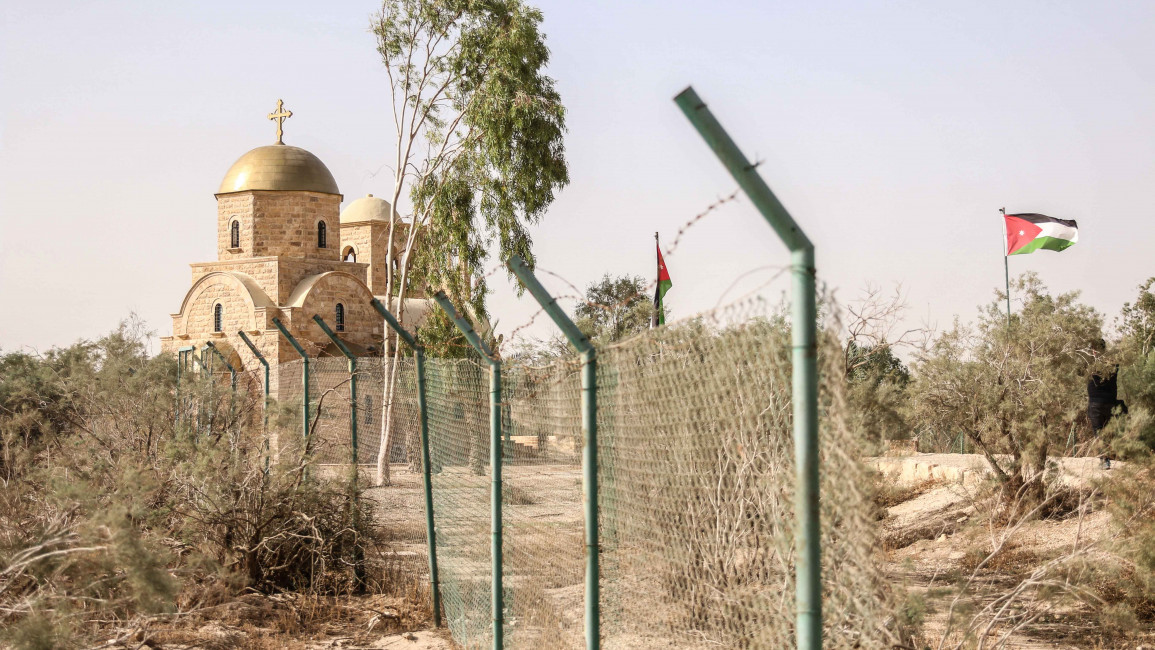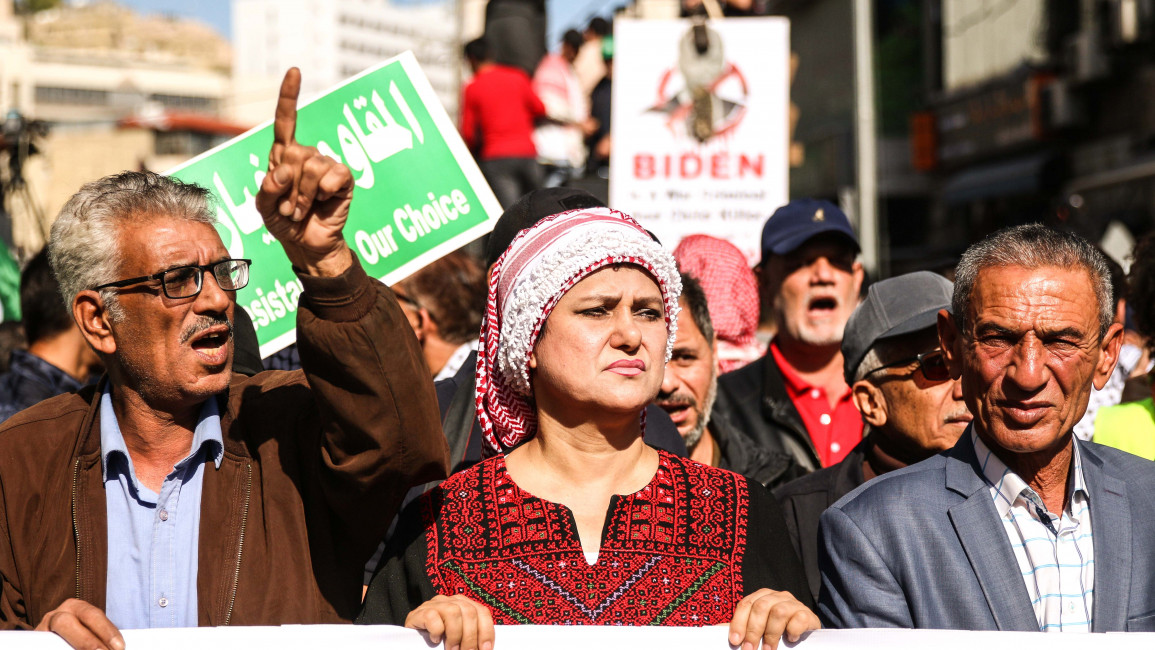Philippe Pernot. 21 December, 2023
In-depth: Israel’s war on Gaza has unleashed existential challenges for Jordan, with water at the heart of diplomatic tensions between both countries.
Since the start of the Israeli war on Gaza – which has killed almost 20,000 Palestinians – thousands of demonstrators have marched every Friday in Amman’s downtown.
‘Israel and America are the real terrorists’, ‘We choose resistance’, ‘Stop the genocide’, are just some of the signs among the crowds.
These marches are nothing short of a political earthquake for Jordan, long reputed to be one of the most stable countries in the Middle East.
But there is also another deep source of discontent among Jordanians: water.
“Israel can decide to cut off our water supply, like it did in Gaza, from one day to the next. It’s a question of survival not to depend on them anymore”
“We don’t want Israel’s water, we don’t want to live in dependence and humiliation,” Amani Younes, a 38-year-old Jordanian-Palestinian demonstrating with her daughter, tells The New Arab.
“Israel can decide to cut off our water supply, like it did in Gaza, from one day to the next. It’s a question of survival not to depend on them anymore,” she says angrily.
Jordan is one of the most water-stressed countries in the world, with an average of 70 litres per person per day, a far cry from the 150 litres recommended by the World Health Organisation (WHO).
Since the US-sponsored peace agreement between Jordan and Israel in 1994, the Jewish state has supplied between 25 and 50 million m3 (mcm) of water to the Hashemite Kingdom every year.
A new water agreement between the countries was due to be ratified last month, swapping Israeli drinking water for Jordanian electricity to increase the country’s water reserves in the face of desertification. There are doubts, however, as to whether the deal will now go ahead.
Diplomatic turmoil
Faced with Israel’s brutal offensive in Gaza and pressure from protesters, the Jordanian government has slammed the door on negotiations.
“Can you imagine a Jordanian minister sitting next to an Israeli minister to sign an agreement on water and electricity, while Israel continues to kill children in Gaza?” Ayman Safadi, Jordan’s Minister of Foreign Affairs, told the press on 16 November.
The issue of water is now at the heart of geopolitical tensions between both countries. Amid the war in Gaza, Jordan is expressing its disagreements with Israel in the most vehement way memorable since the peace accord of 1994.
In the past, despite rising tensions as Israel stepped up its settlement building in the occupied West Bank, the Hashemite Kingdom continued ahead with bilateral agreements with its neighbour.
 In some places, the Jordan River has lost up to 98% of its original flow. [TNA/Philippe Pernot] In some places, the Jordan River has lost up to 98% of its original flow. [TNA/Philippe Pernot] |
Under the terms of a $10 billion deal brokered in 2016, Israel is set to supply Jordan with natural gas for 15 years from its field in the Mediterranean, but the deal has been heavily decried by the Jordanian public.
“Peace between Israel and Jordan is failing because it was not viable and was rejected by the population, which is totally affected by the Palestinian question,” Amer Sabaileh, a geopolitical expert in Amman, tells TNA.
“Jordan is facing a deep crisis, as the Palestinian majority of the population continues to refuse normalisation with Israel, including the consumption of its water, while Jordan already takes a large part of its water from Israel,” he adds.
“We don’t want Israel’s water, we don’t want to live in dependence and humiliation”
Sacred ‘Jordan River’ becomes a polluted stream
Jordan has increased its military presence along the border with Israel to discourage its neighbour from expelling Palestinians from the occupied West Bank.
The banks of the Jordan River – which mark most of the 251 km-long border – are fully militarised and inaccessible to the public.
Sacred to all three monotheistic religions, the river is said to have witnessed the baptism of Jesus, the ascent of Saint Elijah on a chariot of fire, and many other miracles recounted in the Torah, the Bible, and the Quran.
Today, its holy waters are murky and brown and have dried up to a mere stream, the once mighty river, source of life in historic Palestine, now only a shadow of its former self.
In some places, the Jordan River has lost up to 98% of its original flow, according to the Jordanian-Israeli-Palestinian NGO EcoPeace. In addition, chemical and agricultural industries, as well as waste from Israeli settlements, pollute the river.
In 2010, several holy sites on the river were nearly forced to close due to pollution. “Pilgrims are baptised in sewage water,” Myriam al-Jaajaa, president of the Jordanian-Palestinian environmental NGO Arab Group for the Protection of Nature (APN), tells TNA.
 Since the start of the Israeli offensive in Gaza thousands of demonstrators have marched every Friday in Amman’s downtown. [TNA/Philippe Pernot] Since the start of the Israeli offensive in Gaza thousands of demonstrators have marched every Friday in Amman’s downtown. [TNA/Philippe Pernot] |
Jordan, the great loser of water diplomacy
Supplied by several rivers and Lake Tiberias upstream, the flow of the Jordan River was 1.3 billion cubic meters yearly in the 1930s, a large river on which religious ceremonies would be celebrated on boats.
Following the creation of Israel in 1948 and the first Arab-Israeli war, several powers fought to control the region’s water resources. In 1955, Syria, Lebanon, Jordan and Israel came to an agreement where Jordan was to receive 740 mcm and Israel 400 mcm of water from the river basin.
However, Israel built two dams on the Jordan River in 1964, diverting the water to its own farmlands through its National Water Carrier, a large infrastructure project. Syria also built dams on the upstream Yarmouk River, which has further diverted the Jordan River’s waters.
“Israel has institutionalised water theft on a massive scale. All Jordanians feel dispossessed of their own resources and humiliated by the agreements”
As a result, the flow of the river has dropped to less than 200 mcm. This has left Jordan with a polluted stream which cannot be used for irrigation. The 1994 peace agreement states that Israel should give Jordan 50 mcm of clean water a year, “but de facto, it gets half of that”, says al-Jaajaa.
“And the quality was also lacking: many Jordanians fell ill in the 1990s and 2000s because we received contaminated water,” she adds.
To the south of the Jordan River lies the Dead Sea, famous for its salty water on which tourists like to float. Because of the river’s low flow, the sea is disappearing at an alarming rate of one meter per year – meaning it will be completely dry by 2100.
“Israel has institutionalised water theft on a massive scale,” says al-Jaajaa. “All Jordanians feel dispossessed of their own resources and humiliated by the agreements.”
Several Israeli government ministries were contacted but did not respond to The New Arab‘s questions.
https://www.newarab.com/analysis/why-water-centre-jordan-israel-tensions
